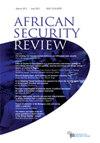A call for innovative security strategies in the face of failing governance
IF 1.1
Q3 INTERNATIONAL RELATIONS
引用次数: 1
Abstract
As peace and security practitioners and scholars we seldom harness the expectations that a new year will bring a fresh start for people caught up in war, other forms of violent conflict and pressures that cause insecurity and distress. However, we know from past experience that where people feel insecure, a critical mass of people still have the energy to find innovative solutions to improve the well-being of people. Also in Africa, many good people share their knowledge of the many spaces in Africa, in the firm belief that wise leaders and other decision makers would find solutions to problems. In this edition, the authors illustrate in an exceptional way some of the efforts that are already bearing fruit towards security for all who dwell in the continent of Africa. An example of such an effort with innovative solutions is the work of Albert K. DomsonLindsay on ‘Mozambique’s Security Challenges’, who offers a critical security perspective to advance the view of a balanced or broader approach to security that goes beyond military response towards addressing the fundamental causes of a conflict. In this regard the author argues that poor governance, characterised by corruption, political patronage, marginalisation of minority groups, centralisation of power and exclusionary practices, under the banner of the Mozambican government, are the major sources of insecurity in the country. John Ishiyama in his article ‘Ethnic versus National Identity in Ethiopia’ reminds us about another cause of insecurity in Africa when he asserts that for many people in a country such as Ethiopia, ethnic identity is more important than national identity, posing a challenge to national identity. Furthermore, Felix Kumah-Abiwu and Francis Sibanda point out in their article on ‘Global War on Terror’ (GWOT), that some African governments such as Kenya and Uganda, continue to benefit from securitised development characterised by underlying contradictions involving the fight against terrorism. However, it is through the securitisation of COVID-19 in Africa, as illustrated by Hamdy Hassan, that many African governments have exploited this pandemic as a deadly threat to state and society to justify unprecedented precautionary measures restricting the freedoms of people. He predicts that the impact of securitisation of COVID-19 on African societies by interventionist states will have extensive socio-political implications in the medium and long term. In his article on ‘The Securitisation of COVID-19 and Authoritarian Politics in Zimbabwe’, Tompson Makahamadze uses Zimbabwe as an example of COVID-19 securitisation. He found that it assisted the ZANU-PF government to consolidate power through measures to contain the coronavirus disproportionate to the threat and followed political party agenda to limit the political freedoms of the opposition coalition. Timothy Donais offers one of the innovative solutions in his article ‘Protection through Peacebuilding in South Sudan’, explaining how the constructive and lasting contribution of UNMISS to protect vulnerable civilians, focussing on the protection of civilian (PoC) sites amidst the exclusive nature of the current peace process, supporting ‘bottom-up’ conflict resolution processes to interact with ‘top-down dynamics’. The vital importance of the ‘bottom-up’面对失败的治理,呼吁采取创新的安全战略
作为和平与安全的实践者和学者,我们很少期望新的一年会给陷入战争、其他形式的暴力冲突和造成不安全和痛苦的压力的人们带来新的开始。然而,我们从过去的经验中知道,在人们感到不安全的地方,相当一部分人仍然有精力找到创新的解决方案来改善人们的福祉。同样在非洲,许多好人分享他们对非洲许多领域的了解,坚信明智的领导人和其他决策者会找到解决问题的办法。在本期中,作者们以一种特殊的方式阐述了为非洲大陆所有居民的安全所做的一些努力,这些努力已经取得了成果。Albert K.DomsonLindsay关于“莫桑比克的安全挑战”的研究就是一个创新解决方案的例子,他提供了一个关键的安全视角,以推进一种平衡或更广泛的安全方法,超越军事反应,解决冲突的根本原因。在这方面,作者认为,以腐败、政治庇护、少数群体边缘化、权力集中和排斥行为为特征的治理不善,是莫桑比克不安全的主要根源。约翰·石山在他的文章《埃塞俄比亚的民族与民族认同》中提醒我们非洲不安全的另一个原因,他断言,对埃塞俄比亚这样的国家的许多人来说,民族认同比民族认同更重要,这对民族认同构成了挑战。此外,Felix Kumah Abiwu和Francis Sibanda在他们关于“全球反恐战争”(GWOT)的文章中指出,肯尼亚和乌干达等一些非洲政府继续受益于证券化发展,其特点是打击恐怖主义的潜在矛盾。然而,正如哈姆迪·哈桑所示,正是通过新冠肺炎在非洲的证券化,许多非洲政府利用这一流行病对国家和社会的致命威胁,为限制人民自由的前所未有的预防措施辩护。他预测,从中长期来看,干预主义国家将新冠肺炎证券化对非洲社会的影响将产生广泛的社会政治影响。Tompson Makahamadze在其题为《新冠肺炎证券化与津巴布韦威权政治》的文章中,以津巴布韦为新冠肺炎证券化的例子。他发现,它通过与威胁不成比例的遏制冠状病毒的措施,帮助非洲民族联盟-爱国阵线政府巩固权力,并遵循政党议程限制反对党联盟的政治自由。Timothy Donais在他的文章《通过南苏丹建设和平进行保护》中提出了一个创新的解决方案,解释了南苏丹特派团如何为保护弱势平民做出建设性和持久的贡献,重点是在当前和平进程的排他性中保护平民遗址,支持“自下而上”的冲突解决过程与“自上而下的动态”互动。“自下而上”的至关重要性
本文章由计算机程序翻译,如有差异,请以英文原文为准。
求助全文
约1分钟内获得全文
求助全文

 求助内容:
求助内容: 应助结果提醒方式:
应助结果提醒方式:


